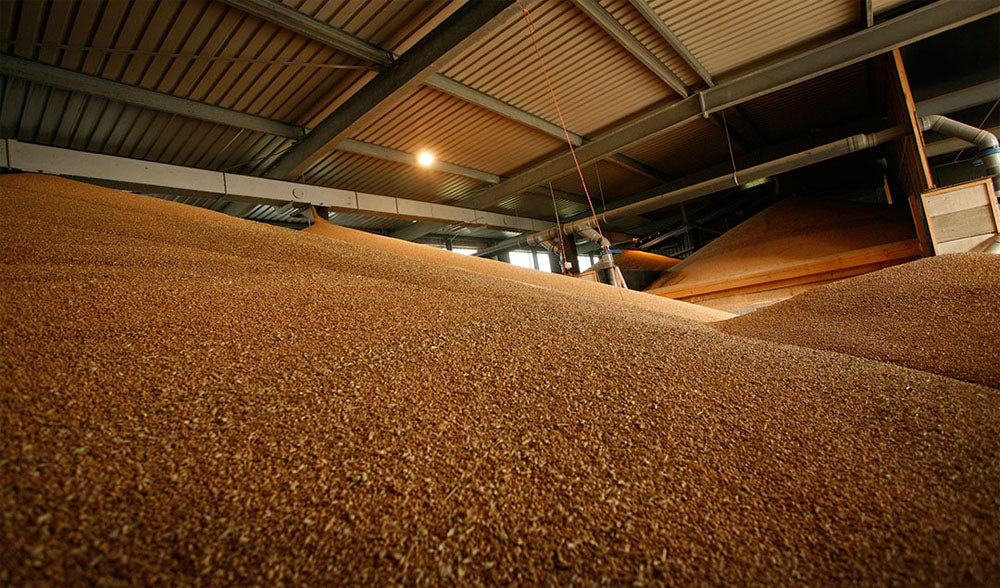
Ozone Treatment for Grain and Feed Disinfection
Share
Experts estimate that 5-15% of the world's cereal grain production is lost during storage, with some developing countries experiencing losses up to 50%. In Canada, food waste is valued at $31 billion annually. Significant losses in stored grains are caused by insects, fungi, and weevils. Wheat grains are especially vulnerable to these pests and contamination. Implementing advanced grain storage technologies can substantially reduce these losses.
Effective fumigants are scarce because many insects have developed resistance to the active ingredients. Additionally, certain disinfectants have been banned due to health and environmental risks. Grain weevils, which develop inside grain kernels, are particularly challenging to target with chemical fumigants.
Proper grain storage management is critical to prevent fungal and mold infestations, which thrive in humid environments and can lead to mycotoxin contamination. Such infestations not only affect the price and quality of grains but also increase the risk of pest contamination. During wheat flour production and storage, external microbiological contamination, including E. coli and Salmonella sp., is common. Maintaining high-quality grain requires careful monitoring of factors like temperature, pH, humidity, and the presence of insects, pests, rodents, fungi, mold, mycotoxins, and odor. Infested grain cannot be used, resulting in significant losses, even if treated with chemical pesticides that may leave undesirable odors and require additional cleaning.

Ozone Treatment: The Best Alternative for Grain & Feed Disinfection
Ozone treatment is increasingly used in agro-food applications to address grain contamination. Research indicates that ozone treatment is effective for disinfecting grains, wheat, and flour, as well as combating microflora, bacterial, fungal, and mold contamination. Ozone treatment kills storage insects at a low operational cost.
Unlike chemical disinfectants, ozone gas leaves no chemical residue as it decomposes quickly into nontoxic products. Ozone treatment is generated on-demand, on-site, eliminating the need for transportation or storage. Ozone use reduces environmental impact and costs without compromising grain quality.
Ozone is a highly reactive gas capable of killing bacteria, viruses, and other pathogens. Ozone generators convert oxygen (O2) into ozone (O3) by passing an electric current through oxygen molecules. The ozone gas, mixed with air or water, is introduced into grain storage or transportation pipelines, where it destroys pathogens.
Ozone treatment is an eco-friendly alternative to chemical disinfectants, breaking down into oxygen (O2) shortly after use, leaving no toxic residue. Its strong oxidizing effect effectively kills even the most resistant pathogens. Maintaining appropriate ozone concentration is crucial to prevent mold growth without harming grain quality. For example, rice grains typically require an ozone concentration of 0.05 to 0.1 ppm (parts per million).

Advantages of Ozone Treatment in Grain Storage
- Produced on-site
- Powerful oxidant, kills all insects
- Eliminates bacteria and undesirable microorganisms
- Deprives rodents of oxygen, preventing entry
- Prevents mold and mycotoxin growth
- Approved for food contact, effective against many microbes
- Eliminates odor in stored grain
- Maintains organoleptic and nutritional value
- Decays into diatomic oxygen, safe for the environment
- Leaves no residue, odor, or chemicals
- Compatible with organic food processing
Why Choose Sihon-Ozone?
Ozone disinfection has been used across industries worldwide for decades. We ensure the correct concentration and application time for ozone treatment to reduce bacterial and fungal contamination effectively and economically. Our ozone treatment solutions offer a reliable alternative to traditional methods.
Sihon-Ozone engineers are ready to provide unlimited technical assistance to ensure the success of your ozone treatment project.
Contact us today for more information about implementing ozone treatment in your project and explore its potential benefits.
